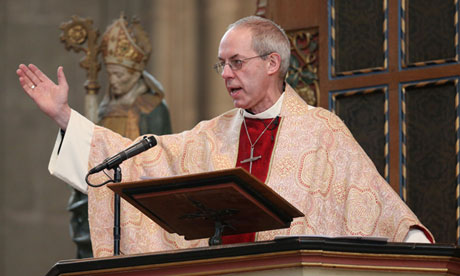http://www.guardian.co.uk/uk/2013/mar/31/archbishop-justin-welby-warns-against-trusting-leaders
Archbishop Justin Welby warns against trusting fallible leaders

Blind belief in the power of the individual to bring about true change in any sphere, he said, was simplistic and wrong, and led inevitably to disillusionment and disappointment.
"Put not your trust in new leaders, better systems, new organisations or regulatory reorganisation," he told the congregation at Canterbury cathedral. "They may well be good and necessary, but will to some degree fail. Human sin means pinning hopes on individuals is always a mistake, and assuming that any organisation is able to have such good systems that human failure will be eliminated is naive."
In a lengthy broadside against what he termed the "hero leader culture" – with its automatic expectations of quick, easy and gratifying solutions to even the most intractable problems – Welby said that only by acknowledging God and trusting in his power could human beings escape "cynical despair" and fear.
"Human fallibility recognised, God's sovereignty trusted; these are also the only stable foundations for human beings in society," he said. "Setting people or institutions up to heights where they cannot but fail is mere cruelty."
As one might expect from an archbishop who has already criticised some of the government's austerity measures and compared reports of the Cypriot financial crisis to accounts of the crucifixion, the sermon did not shy away from uncomfortable temporal realities.
"A political party gets a new leader and three months later there is comment about disappointment," he said. "An economy suffers the worst blow in generations with a debt crisis and economic downturn, and the fact that not everything is perfect within five years is seen as total failure."
By ignoring complexity and humanity, he said, "we end up unreasonably disappointed with every institution, group and policy, from politicians to NHS, education to environment".
Welby did not spare himself or his church, either.
In a half-humorous, half-deadly serious allusion to the challenges he faces as leader of the world's 77 million Anglicans over struggles with the issues of female bishops and same-sex marriage, he added:
"Papers reported on Friday that only 40% of churchgoers are convinced that the new archbishop of Canterbury can resolve the problems of the Church of England. I do hope that means the other 60% thought the idea so barking mad that they did not answer the question."
A joyful and celebratory church, Welby said, was based "not in vain human optimism but in the certainty that God raised Jesus from the dead and will also raise us". That certainty and acceptance of fallibility, he went on, allowed Christians to be merciful to one another, to heed God's call and to keep "working for and expecting a new shape and life to the church".
However, the archbishop admitted that Christianity's leaders had not always listened to God when confronted with "the fearful consequences of change" and had, as a result, made many serious mistakes.
"Tenuous semblances of power are better than the apparent gamble on God's faithfulness," he said. "The church has often fallen into the trap. In the 18th century the Church of England drove out the Methodists. In the 16th century Rome drove out the Reformers. Societies that cling to the present or some golden age in the past fall prey to fear. Groups that cling to power sink into oppression."
Welby concluded the sermon by quoting the Welsh poet and Anglican priest, RS Thomas, from his poem Threshold, on the human need for communion with God: "I am alone on the surface / of a turning planet. What / to do but, like Michelangelo's / Adam, put my hand / out into unknown space, / hoping for the reciprocating touch?"
No comments:
Post a Comment